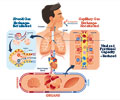Spending a year in space decreased the size of an astronaut’s heart.

TOP INSIGHT
Astronaut Scott Kelly lost an average of 0.74 grams of mass per week in his heart's left ventricle during his 340 days spent in space
Read More..
The scientists compared Kelly's heart with the effects seen in Lecomte, who lost an average of 0.72 grams of mass per week in his left ventricle.
Benjamin Levine, senior author, explains that endurance swimming mimics some of the effects created by space's weightlessness, as water pressure counters the effects of gravity. During both situations, the heart does not have to work as hard to pump blood uphill from the feet.
Levine reveals that despite the shrinkage, which was accompanied by an initial drop in the left ventricle's diameter when relaxed to fill with blood (diastolic diameter), the astronaut's heart adapted relatively well.
"It did shrink a little bit. It did atrophy, and it did get a little smaller, but the function remained good," Levine says. "I think this is encouraging for long-duration space flight. It shows that even after a year in space, the heart adapts relatively well."
The researcher was more surprised by the swimmer's loss of mass than the astronaut because Lecomte swam six hours per day on an average while Kelly spent only one to two hours exercising.
A different research project of Levine revealed that cardiac adaptation to space varied from astronaut to astronaut, with the most-fit astronauts losing heart muscle mass during their stay in space (though not as much as with strict bed rest), while some of the least fit gained muscle mass.
"It all depended on how much work the astronaut's heart did in space relative to how much it regularly did on the ground," Levine says.
Source-Medindia
 MEDINDIA
MEDINDIA




 Email
Email










